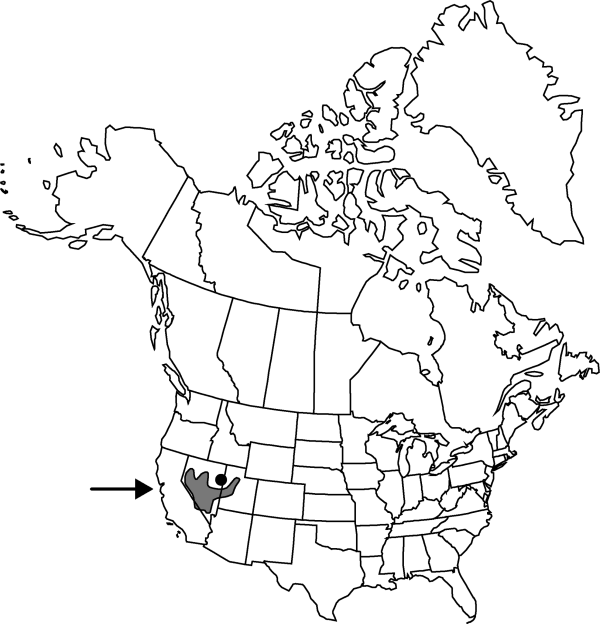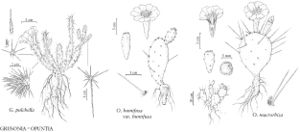Difference between revisions of "Grusonia pulchella"
Phytologia 26: 176. 1973.
FNA>Volume Importer |
imported>Volume Importer |
||
| (7 intermediate revisions by 2 users not shown) | |||
| Line 8: | Line 8: | ||
}} | }} | ||
|common_names=Sand club-cholla | |common_names=Sand club-cholla | ||
| − | |basionyms={{Treatment/ID/ | + | |special_status={{Treatment/ID/Special_status |
| + | |code=F | ||
| + | |label=Illustrated | ||
| + | }}{{Treatment/ID/Special_status | ||
| + | |code=E | ||
| + | |label=Endemic | ||
| + | }} | ||
| + | |basionyms={{Treatment/ID/Basionym | ||
|name=Opuntia pulchel | |name=Opuntia pulchel | ||
|authority=la Engelmann | |authority=la Engelmann | ||
| + | |rank=species | ||
| + | |publication_title=Trans. Acad. Sci. St. Louis | ||
| + | |publication_place=2: 201. 1863 | ||
}} | }} | ||
|synonyms={{Treatment/ID/Synonym | |synonyms={{Treatment/ID/Synonym | ||
|name=Corynopuntia pulchella | |name=Corynopuntia pulchella | ||
|authority=(Engelmann) F. M. Knuth | |authority=(Engelmann) F. M. Knuth | ||
| − | }}{{Treatment/ID/Synonym | + | |rank=species |
| + | }} {{Treatment/ID/Synonym | ||
|name=Micropuntia barkleyana | |name=Micropuntia barkleyana | ||
|authority=Daston | |authority=Daston | ||
| − | }}{{Treatment/ID/Synonym | + | |rank=species |
| + | }} {{Treatment/ID/Synonym | ||
|name=Micropuntia brachyrhopalica | |name=Micropuntia brachyrhopalica | ||
|authority=Daston | |authority=Daston | ||
| − | }}{{Treatment/ID/Synonym | + | |rank=species |
| + | }} {{Treatment/ID/Synonym | ||
|name=Micropuntia gracilicylindrica | |name=Micropuntia gracilicylindrica | ||
|authority=Daston | |authority=Daston | ||
| − | }}{{Treatment/ID/Synonym | + | |rank=species |
| + | }} {{Treatment/ID/Synonym | ||
|name=Micropuntia pygmaea | |name=Micropuntia pygmaea | ||
|authority=Wiegand & Backeberg | |authority=Wiegand & Backeberg | ||
| − | }}{{Treatment/ID/Synonym | + | |rank=species |
| + | }} {{Treatment/ID/Synonym | ||
|name=Micropuntia spectatissima | |name=Micropuntia spectatissima | ||
|authority=Daston | |authority=Daston | ||
| − | }}{{Treatment/ID/Synonym | + | |rank=species |
| + | }} {{Treatment/ID/Synonym | ||
|name=Micropuntia tuberculosirhopalica | |name=Micropuntia tuberculosirhopalica | ||
|authority=Wiegand & Backeberg | |authority=Wiegand & Backeberg | ||
| − | }}{{Treatment/ID/Synonym | + | |rank=species |
| + | }} {{Treatment/ID/Synonym | ||
|name=Micropuntia wiegandii | |name=Micropuntia wiegandii | ||
|authority=Backeberg | |authority=Backeberg | ||
| + | |rank=species | ||
}} | }} | ||
|hierarchy=Cactaceae;Cactaceae subfam. Opuntioideae;Grusonia;Grusonia pulchella | |hierarchy=Cactaceae;Cactaceae subfam. Opuntioideae;Grusonia;Grusonia pulchella | ||
| Line 44: | Line 62: | ||
}}<!-- | }}<!-- | ||
| − | --><span class="statement" id="st- | + | --><span class="statement" id="st-undefined" data-properties=""><b>Shrubs,</b> forming clumps, 10–20 cm. <b>Roots</b> tuberlike, 7–10 × 3.5–5(–7.5) cm. <b>Stem</b> segments cylindric to ellipsoid, clavate, 1–4(–10) × 0.5–1.2(–2.5) cm; tubercles rather prominent, 5–9 mm; areoles 1–2 mm in diam.; wool white to gray. <b>Spines</b> 8–15 per areole, mostly in distal areoles, divergent to deflexed, red-brown or white, aging gray, flattened, longest to 6 cm. <b>Glochids</b> adaxial in areole, yellow to reddish yellow, to 8 mm, barbed. <b>Flowers</b>: inner tepals rose to purple, 15–25 mm; filaments green to yellow; style purplish; stigma lobes white to yellowish. <b>Fruits</b> reportedly reddish, obconic, 15–30 8–12 mm, fleshy, smooth; spines hairlike, flexible, antrorsely barbed; areoles ± 50. <b>Seeds</b> whitish, 3–6 mm broad. <b>2n</b> = 22.</span><!-- |
-->{{Treatment/Body | -->{{Treatment/Body | ||
| + | |phenology=Flowering late spring (May–Jul). | ||
|habitat=Mojave Desert, Great Plains, sandy to rocky flats or slopes, often at edges of dry washes and lakes | |habitat=Mojave Desert, Great Plains, sandy to rocky flats or slopes, often at edges of dry washes and lakes | ||
|elevation=1200-1900 m | |elevation=1200-1900 m | ||
|distribution=Calif.;Nev.;Utah. | |distribution=Calif.;Nev.;Utah. | ||
| − | |discussion=<p>Reports of Grusonia pulchella in Arizona (L. D. Benson 1969, 1982; J. Lode 1993) are undocumented (B. D. Parfitt 1988) or lack adequate specimens. Those reports resulted either from locality data errors or confusion with G. parishii or Cylindropuntia whipplei.</p> | + | |discussion=<p>Reports of <i>Grusonia pulchella</i> in Arizona (L. D. Benson 1969, 1982; J. Lode 1993) are undocumented (B. D. Parfitt 1988) or lack adequate specimens. Those reports resulted either from locality data errors or confusion with <i>G. parishii</i> or <i>Cylindropuntia whipplei</i>.</p> |
|tables= | |tables= | ||
|references= | |references= | ||
| Line 59: | Line 78: | ||
-->{{#Taxon: | -->{{#Taxon: | ||
name=Grusonia pulchella | name=Grusonia pulchella | ||
| − | |||
|authority=(Engelmann) H. Robinson | |authority=(Engelmann) H. Robinson | ||
|rank=species | |rank=species | ||
| Line 66: | Line 84: | ||
|basionyms=Opuntia pulchel | |basionyms=Opuntia pulchel | ||
|family=Cactaceae | |family=Cactaceae | ||
| + | |phenology=Flowering late spring (May–Jul). | ||
|habitat=Mojave Desert, Great Plains, sandy to rocky flats or slopes, often at edges of dry washes and lakes | |habitat=Mojave Desert, Great Plains, sandy to rocky flats or slopes, often at edges of dry washes and lakes | ||
|elevation=1200-1900 m | |elevation=1200-1900 m | ||
| Line 72: | Line 91: | ||
|publication title=Phytologia | |publication title=Phytologia | ||
|publication year=1973 | |publication year=1973 | ||
| − | |special status= | + | |special status=Illustrated;Endemic |
| − | |source xml=https:// | + | |source xml=https://bitbucket.org/aafc-mbb/fna-data-curation/src/2e0870ddd59836b60bcf96646a41e87ea5a5943a/coarse_grained_fna_xml/V4/V4_237.xml |
|subfamily=Cactaceae subfam. Opuntioideae | |subfamily=Cactaceae subfam. Opuntioideae | ||
|genus=Grusonia | |genus=Grusonia | ||
|species=Grusonia pulchella | |species=Grusonia pulchella | ||
| − | |||
| − | |||
| − | |||
| − | |||
| − | |||
| − | |||
| − | |||
| − | |||
| − | |||
| − | |||
| − | |||
| − | |||
| − | |||
| − | |||
| − | |||
| − | |||
| − | |||
| − | |||
| − | |||
| − | |||
| − | |||
| − | |||
| − | |||
| − | |||
| − | |||
| − | |||
| − | |||
| − | |||
| − | |||
| − | |||
| − | |||
| − | |||
| − | |||
| − | |||
| − | |||
| − | |||
| − | |||
| − | |||
| − | |||
| − | |||
| − | |||
| − | |||
| − | |||
}}<!-- | }}<!-- | ||
-->[[Category:Treatment]][[Category:Grusonia]] | -->[[Category:Treatment]][[Category:Grusonia]] | ||
Latest revision as of 22:57, 5 November 2020
Shrubs, forming clumps, 10–20 cm. Roots tuberlike, 7–10 × 3.5–5(–7.5) cm. Stem segments cylindric to ellipsoid, clavate, 1–4(–10) × 0.5–1.2(–2.5) cm; tubercles rather prominent, 5–9 mm; areoles 1–2 mm in diam.; wool white to gray. Spines 8–15 per areole, mostly in distal areoles, divergent to deflexed, red-brown or white, aging gray, flattened, longest to 6 cm. Glochids adaxial in areole, yellow to reddish yellow, to 8 mm, barbed. Flowers: inner tepals rose to purple, 15–25 mm; filaments green to yellow; style purplish; stigma lobes white to yellowish. Fruits reportedly reddish, obconic, 15–30 8–12 mm, fleshy, smooth; spines hairlike, flexible, antrorsely barbed; areoles ± 50. Seeds whitish, 3–6 mm broad. 2n = 22.
Phenology: Flowering late spring (May–Jul).
Habitat: Mojave Desert, Great Plains, sandy to rocky flats or slopes, often at edges of dry washes and lakes
Elevation: 1200-1900 m
Distribution

Calif., Nev., Utah.
Discussion
Reports of Grusonia pulchella in Arizona (L. D. Benson 1969, 1982; J. Lode 1993) are undocumented (B. D. Parfitt 1988) or lack adequate specimens. Those reports resulted either from locality data errors or confusion with G. parishii or Cylindropuntia whipplei.
Selected References
None.
